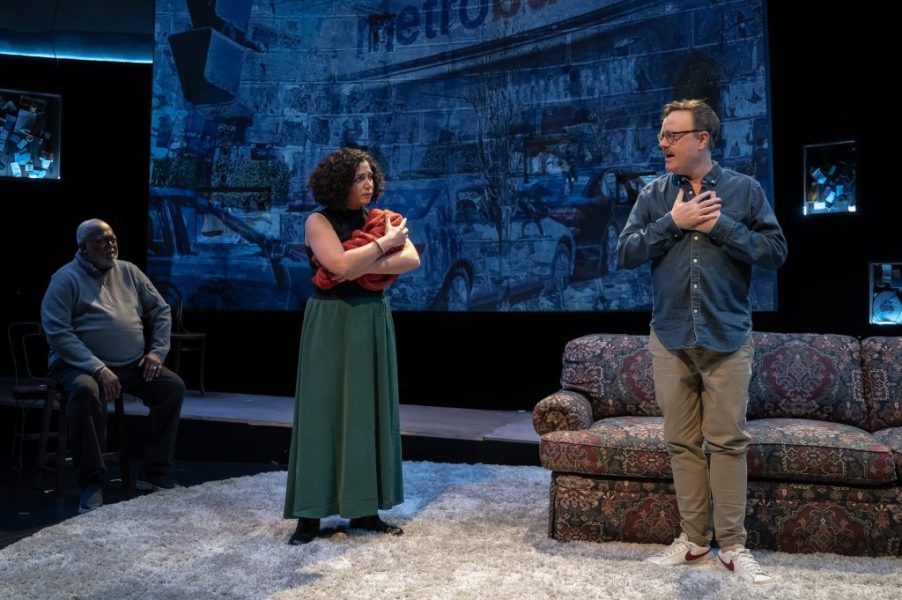
William T. Newman, Jr., Raghad Makhlouf, and Tom Story in Mosaic Theater’s production of “The Art of Care.” Photo by Chris Banks.
Within the first few minutes of sitting down to see “The Art of Care” conceived and directed by Derek Goldman, a cast member asked me the name of someone I’d cared for or who’d cared for me. I gave them the name of my grandmother who passed after a decade-long battle with Alzheimer’s in 2014, expecting to be subsequently devastated by its usage. It is a testament to Mosaic Theatre Company’s new show, now playing at the Atlas Performing Arts Center, that its deep dive into the heartfelt act of care did the opposite, uplifting the joy and sacrifice inherent in the act of caring for one another.
…uplifting the joy and sacrifice inherent in the act of caring for one another…it chooses to remind us of the personal power that great care can hold.
“The Art of Care” aims to take a holistic, all-encompassing look at what care means, examining overstuffed hospital systems and diligent spouses with the same lens. It focuses on experience: the emotion and impact of carers and caring. This combines the accounts of various carers and the company, creating a quilt-like matrix of stories to pull it along. As a bonus, this gives performers with drastically different styles an excellent chance to shine. The subtle physicality of Billie Krishawn allows her to embody a precocious child, dying mother, and exhausted doctor with equal veracity. Meanwhile, percussionist and performer Jabari Exum’s simple, personality-driven delivery commanded center stage when he chose to speak. Most spectacular may be Tuyet Thi Pham, who utilizes both techniques to pull the threads of the twin tales of her mother’s passing and the fall of Saigon into a deeply moving whole.
Under the watchful eye of director Derek Goldman, the cast pulls off a quite smart experiential trick. The tone of delivery here is conversational, more like a group therapy session than a dramatic experience, a vibe that frequently shows the back of actors’ heads, which, contrary to theatrical convention, works. The actor’s flowing movement around the stage injects it with compelling energy, never falling into the same formation twice without a clear purpose. There’s a great challenge in balancing energy and calm, but to find serenity out of the combination is even more impressive. Exum’s elegant, measured drumming underscores that sense of serenity, keeping the audience’s tension from growing too intensely.
The show’s greatest issue, typical amongst devised productions, is a lack of focus. By constructing care so broadly, it fails to consider what, beyond pure emotion, unifies the experience of caring. Furthermore, because so much of its focus is on the performers’ intimate experience being cared for, it skips the mindset of many of those performing the care, focusing instead on their actions. For a show with such a broad remit, that isn’t inherently a problem. When, however, the two factors are combined with the show’s closing call to action, which demands a reorientation of our culture and politics to better center care, the thin link between each element undercuts the power of that final note.
But power may not be the purpose of the show. Its aesthetics, clearly put forth by lighting designer Venus Gulbranson and set designer Misha Kachman, balance a stark industrial look with warm bohemian visuals. It’s a living room in a bunker, an apt visual metaphor for a moment like this. Projections, by Zavier Augustus Lee Taylor, are exceptionally designed, but there’s a storybook quality to much of them which adds to that feeling of coziness. That warmth has a power of its own, reminding us how impactful actions and modes of living that we often take for granted can be.
My Nana passed after years of fighting with a rotting and brutal dissolution of her personhood. To help her, an army of carers fought day and night to keep her safe, alive, and comfortable. Of that army, there is not one to whom I don’t owe a debt of gratitude, but there is one I won’t forget. Her former coworker at the Salon, who came to her assisted living facility and applied lipstick and makeup to her, made sure her hair stayed the color she liked, and gave her a cause to keep that thing she held so tightly—her dignity.
“The Art of Care” is imperfect, with a perspective too unfocused to be effective as a polemic. However, in highlighting the ordinary work of care and the small dignities that affords, it chooses to remind us of the personal power that great care can hold.
Running Time: One hour and 30 minutes with no intermission.
Advisory: Age 14+, contains discussions of disease, homophobia, traumatic experience, and violence towards refugees.
“The Art of Care” runs through November 24, 2024 at the Atlas Performing Arts Center, 1333 H Street NE, Washington, DC 20002. Produced in partnership with The Laboratory for Global Performance and Politics at Georgetown University and developed in collaboration with The Global Health Institute, School of Health, School of Nursing, Medstar Health, and Medical Humanities Initiative at Georgetown University. For more information and to purchase tickets, call the Box Office at 202-399-7993, or please go online.

